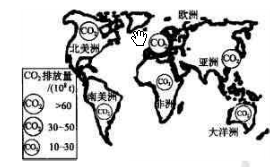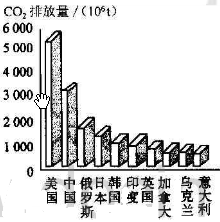读“世界各大洲工业CO2排放量”示意图、“世界CO2排放量最多的十国”柱状图及有关资料,回答下列各题。

世界各大洲工业CO2排放量

世界CO2排放量最多的十国
(1)图中CO2排放量最多的三个大洲是 、 、 。
(2)上图所示十国中,CO2人均排放量最多的国家是 ,最少的亚洲国家是 。
(3)CO2排放量居世界第二位的国家是 ,其能源消费结构以 为主。
(4)在工业发达国家中,CO2人均排放量法国仅为英国的52.5%、德国的56%,从法国能源消费结构分析,其主要的原因是
(5)大气中CO2增多的主要原因是
(6)最近美国政府决定放弃实施《京都议定书》所规定的义务,消息传出即引起世界众怒,这是因为大气中CO2含量增多,将对世界气候产生的主要影响是
(7)你认为大气中CO2含量增多,将会给世界沿海城市带来什么影响?
(8)要降低大气中CO2浓度,你认为可以采取哪些措施?(至少写二条)
(1)欧洲 北美洲 亚洲
(2)美国 印度
(3)中国 煤炭
(4)法国70%的电能由核电提供
(5)大量燃烧矿物能源、过度砍伐森林等
(6)产生温室效应,世界气候变暖
(7)世界气候变暖,极地冰川融化,造成海平面上升,导致沿海城市被淹,影响沿海地区经济的发展。
(8)减少CO2排放,推广绿色能源(如水电、风能、太阳能等)。
国际社会关注的全球性环境问题,主要包括全球变暖、臭氧层破坏和酸雨危害。其中全球变暖的主要原因是排放温室气体和破坏植被引起的,它的危害主要是对全球生态环境和社会经济产生重大影响以及引起世界各国经济结构的变化。不同地域,由于生产力水平的差异,工业CO2的排放也存在明显的地区差异。由于全球变暖打破了地域和国家疆界,为了保护全球大气环境,制定和通过了《京都议定书》,通过国际合作来解决问题。
